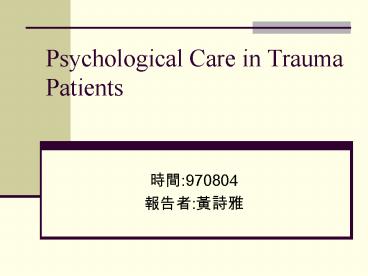Psychological Care in Trauma Patients - PowerPoint PPT Presentation
1 / 18
Title:
Psychological Care in Trauma Patients
Description:
Causes of psychological problems. Symptoms of ICU psychosis. Psychological reactions ... imbalance, hypoxia (low blood oxygen levels), and elevated liver enzymes. ... – PowerPoint PPT presentation
Number of Views:189
Avg rating:3.0/5.0
Title: Psychological Care in Trauma Patients
1
Psychological Care in Trauma Patients
- ??970804
- ??????
2
Content of Topics
- Introduction
- Causes of psychological problems
- Symptoms of ICU psychosis
- Psychological reactions
- Assessment
- Interventions to prevent psychological problems
- Management of PTSD/ASD
- Specific patient groups
- Families of trauma patients
- Conclusions
3
Introduction
- What is ICU psychosis?
- ICU psychosis is ICU syndrome.
- ICU psychosis is also a form of delirium, or
acute brain failure. - How long does ICU psychosis last?
- it may last 24 hours or even up to two weeks
with fluctuations of the level of consciousness
and behavior patterns.
4
Causes of psychological problems
- Sudden and unexpected nature of events
- Pain
- ICU environment
- Other factors .The loss of control over their
lives that patients often feel in an ICU.
5
What causes ICU psychosis?
- Environmental Causes
- Sensory deprivation (being put in a room often
without windows, away from family, friends and
all that is familiar) - Sensory overload (being tethered to noisy
machines day and night) - Sleep disturbance and deprivation
- Continuous light levels
- Stress
- Lack of orientation
- Medical monitoring
6
What causes ICU psychosis?
- Medical Causes
- Pain (which may not be adequately controlled in
an ICU) - Critical illness The pathophysiology of the
disease, illness or traumatic event - the stress
on the body during an illness can cause a variety
of symptoms. - Medication (drug) reaction or side effects
- Infection creating fever and toxins in the body.
- Metabolic disturbances electrolyte imbalance,
hypoxia (low blood oxygen levels), and elevated
liver enzymes. - Heart failure (inadequate cardiac output)
- Cumulative analgesia (the inability to feel pain
while still conscious) - Dehydration
7
Symptoms of ICU psychosis
- extreme excitement
- anxiety
- restlessness
- hearing voices
- clouding of consciousness
- hallucinations
- nightmares
- paranoia
- disorientation
- agitation
- delusions
- abnormal behavior
- fluctuating level of consciousness which include
aggressive or passive behavior.
8
Specific problems threatening traumatised patient
- Helplessness
- Humiliation
- Body image
- Mental symptoms
9
Psychological reactions
- Conservation withdrawal
- Denial
- Regression
- Anger
- Anxiety
- Depression
- Grief
- (Denial,bargaining,anger,depression and
acceptance )
10
Assessment
- Impact of event scale (IES) a self-report 15-item
scale - Clinician administered PTSD scale (CAPS) 30-item
structured interview - Brief symptom inventory (BSI)
- Structured clinical Interview for DSM-IV
disorders (SCID-IV) - Post-traumatic diagnostic scale (PTDS)
- Davidson trauma scale (DTS)
- Mississippi scale for post-traumatic stress
disorder(MISS)
11
Can ICU psychosis be prevented?
- using more liberal visiting policies
- providing periods for sleep
- protecting the patient from unnecessary
excitement - minimizing shift changes in the nursing staff
caring for a patient, orienting the patient to
the date and time - reviewing all medical procedures with an
explanation about what to expect - asking the patient if there are any questions or
concerns - talking with the family to obtain information
regarding religious and cultural beliefs, and - even coordinating the lighting with the normal
day-night cycle, etc.
12
Interventions to prevent psychological problems
- Pain control?analgesic drugs
- Liberal reassurance
- Family support
- Day-awake,night-asleep
- Removing many wires and tubes
- Constant and monotonus sounds like that of an air
conditioner should be minimished. - Large clock,calendar and and outside window
visible to the patients to help with
orientation. - Personally familiar beside objects such as
clock,radio or family photographs. - Use spectacles or hearing aids. Such as radio or
television sets to provide meaningful sensory
stimuli - The atmosphere created by staff members can be
made more supportive. - Repeated explanations or instructions may become
necessary due to deficit in recent memory. - Medical discussions should be avoided.
- Social support to overcome their financial
problems.
13
Management of PTSD/ASD
- Psychotherapy
- Cognitive-behavioural therapy(CBT) ,includes
exposure procedures , cognitive restructuring
procedures , Anxiety Management programs - Pharmacotherapy
- Tricyclic antidepressants and MAO inhibitors
- Selective serotonin reuptake inhibitors (SSRIs)
and serotonin antagonist and reuptake
inhibitors(SARIs)
14
Specific patient groups
- Head injured patients
- rehabilitation starts within first 6 months
- Patients with spinal cord injury
- kinetic therapy , regarding sexual relations and
functioning should be dealt with honestly. - Patients with amputated limbs
- Psycho-therapeutic interventions , vocational
retraining
15
- Thanks for your attention.
16
Death and dying
- It becomes a demanding task on the part of the
treating clinician to support a patient who is
confounded by the fear of being alone and in
pain.
17
Families of trauma patients
- Intervention strategies
- Two-way commumication
- Honest information
- Regular meetings with family
- Message board can be provided outside ICU or
trauma ward - Written information
- Waiting area should be well-lit and comfortable
with windows,telephone,coffee and vending
machines
18
Conclusions
- It is the responsibility of the treating
personnel to comprehend the psychological effects
of trauma in patients and their families, and to
take necessary steps to prevent and treat these
through knowledge, skill and understanding.































![[PDF] Healing the Soul Wound: Trauma-Informed Counseling for Indigenous Communities (Multicultural Foundations of Psychology and Counseling Series) Free PowerPoint PPT Presentation](https://s3.amazonaws.com/images.powershow.com/10078387.th0.jpg?_=202407130810)